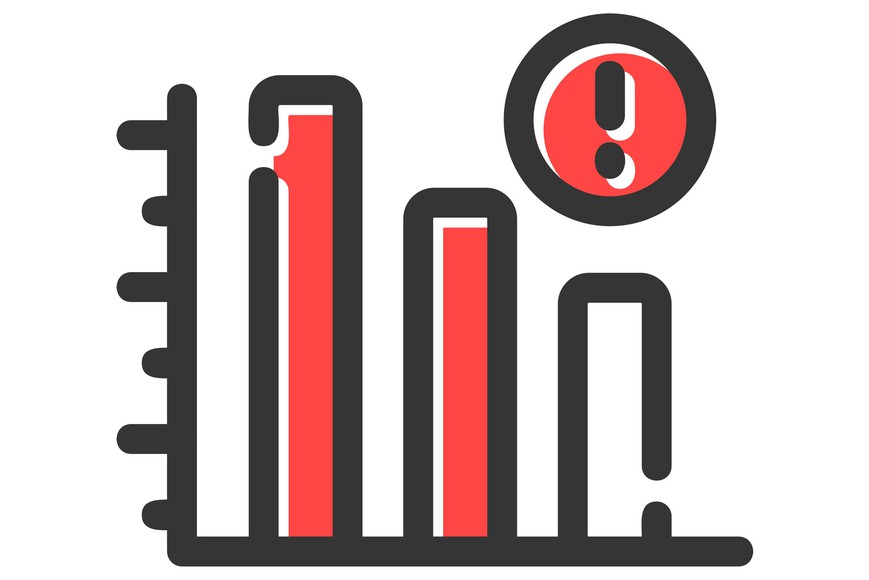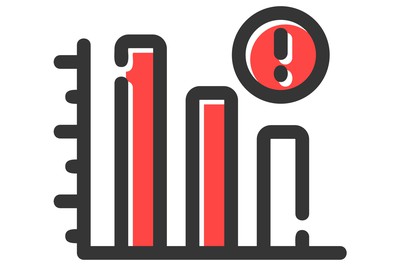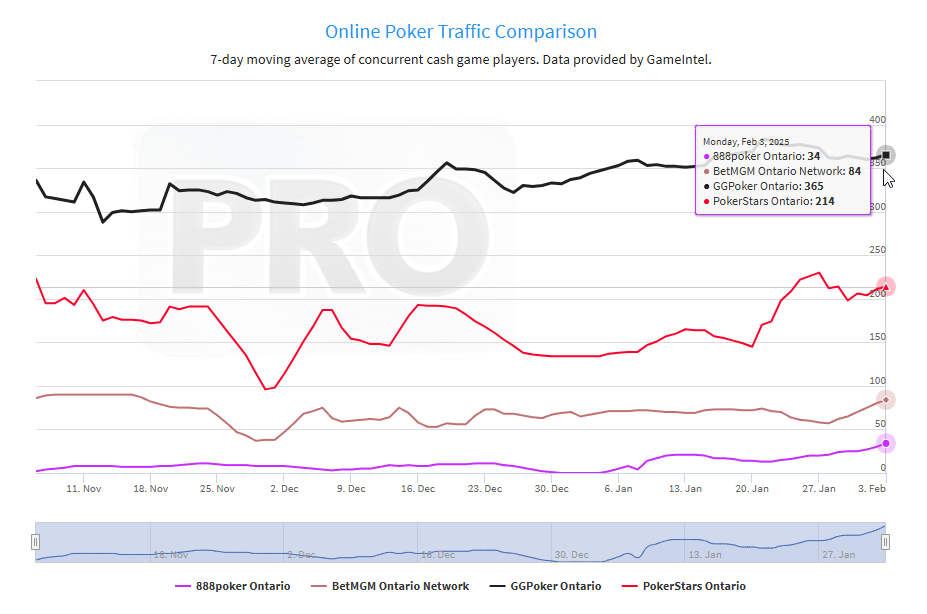

Ontario’s online poker market appears to have hit a plateau, with recent figures indicating that 2025 could be a down year unless a major shift—such as the province rejoining international shared liquidity—takes place.
The latest data from iGaming Ontario (iGO) shows that the six real money online poker rooms in Ontario generated CAD $16 million in revenue between October and December. This marks a decline from the CAD $17 million recorded during the same period the previous year.
Gross gaming revenue dropped year-over-year in each of the three months: October saw a 2% decline, November fell by 4%, and December dipped by 7%, with wagers following a similar downward trend.
For the first time since Ontario’s regulated online poker market launched, a quarter has posted a year-over-year decline.
It’s a disappointing end to a year that had previously seen steady, albeit modest, single-digit growth. In total, online poker revenue for 2024 reached CAD $67.7 million—an increase over 2023’s $63 million, but one that signals near-flat growth.
Ontario Online Poker Revenue Breakdown by Year:
- 2022: CAD $24.7M
- 2023: CAD $63M
- 2024: CAD $67.7M
The stagnation is particularly glaring when compared to the explosive growth of other igaming verticals. Ontario online casino revenue surged to an all-time high of $224.4 million in December 2024, a massive 35% increase over the same month the previous year.
Peer-to-peer poker remains a small fraction of the market, accounting for just 2.1% of Ontario’s total igaming revenue in December and 2.2% for all of 2024—down from 2.8% in 2023.
Could International Liquidity Revive Ontario’s Online Poker Market?
Without a significant shake-up, 2025 could be a down year for Ontario’s online poker market. The likelihood of a new operator entering the space remains low—while iPoker has previously expressed interest in the past, the province’s ring-fenced market makes expansion less appealing.
One potential game-changer would be Ontario rejoining international shared liquidity, which could provide a much-needed boost to peer-to-peer poker revenue.
Since the province’s igaming market launched in April 2022, operators offering online poker and daily fantasy sports (DFS) have been restricted to Ontario-only player pools. However, the province is now exploring whether it can permit international liquidity for both verticals without violating Canada’s federal Criminal Code.
The Ontario Court of Appeal heard arguments on the matter in November, and while a decision is expected, the timeline remains uncertain—it could take weeks or even months.
A favorable court ruling could be a game-changer for the province, allowing operators like PokerStars, GGPoker, PartyPoker (part of the BetMGM Network), and 888poker to reconnect their Ontario player pools with their global networks. This would lead to larger tournament prize pools, more active cash games around the clock, and a modest boost in revenue—helping to revitalize the market.
Alternatively, the court may uphold the requirement for a closed player pool but permit shared liquidity across provincial borders. With Alberta online poker expected to be regulated as soon as this year, it could mark the beginning of a multi-provincial online poker network similar to the US’s Multi-State Internet Gaming Agreement (MSIGA). Quebec online poker could also increase the size of regulated online poker in Canada.
Either outcome would help unlock growth and attract further investment in Ontario’s online poker market.
Who Tops the Ontario Online Poker Market?
Ontario’s online poker market currently consists of six poker rooms spread across four distinct networks. GGPoker, PokerStars, 888poker, and BetMGM make up the key networks, with the first three operating as standalone brands. Meanwhile, the BetMGM Ontario network comprises BetMGM Poker, PartyPoker Ontario, and Bwin Poker, all sharing the same player pool.
Unlike many US regulators, Ontario’s regulator does not provide a revenue breakdown by operator. However, using cash game traffic data, we can estimate market shares.
GGPoker Ontario is the clear market leader, commanding an estimated 52% market share. According to data tracked by independent monitor GameIntel and available on the Poker Industry PRO platform, the platform averages 365 concurrent cash game seats.
PokerStars Ontario ranks second with a 30% market share, averaging 214 concurrent cash game seats. The BetMGM Ontario network, including PartyPoker and Bwin, holds third place with a combined 12% share and an average of 84 seats. 888poker Ontario trails behind with just 34 concurrent seats, representing 5% of the market.
The whole Ontario online poker market sustains an average of just under 700 concurrent cash game seats.

Using these cash game figures, we can estimate the revenue each operator may have generated in Ontario.
With total online poker revenue reaching CAD $16 million in the final quarter of 2024, GGPoker Ontario likely accounted for approximately $8 to $9 million ($2.67 to $3 million per month). PokerStars Ontario’s share would be around $5 million ($1.67 million per month), while the BetMGM network likely brought in about $2 million. 888poker Ontario, the smallest operator, would have contributed roughly $800k.
However, these estimates should be approached with caution, as they are based solely on cash game traffic. Tournament revenue also plays a major role in overall earnings, meaning actual operator revenues could differ.
Ontario Poker Operators Estimated Revenue From Oct – Dec 2024:
| Network | Estimated Last Quarter Earning (CAD) |
|---|---|
| GGPoker/WSOP | ~ $8M – $9M |
| PokerStars | ~ $4.5M – $5M |
| BetMGM | ~ $1.75M – $2M |
| 888poker | ~ $700K – $800K |
| Total Earnings | $16M |

